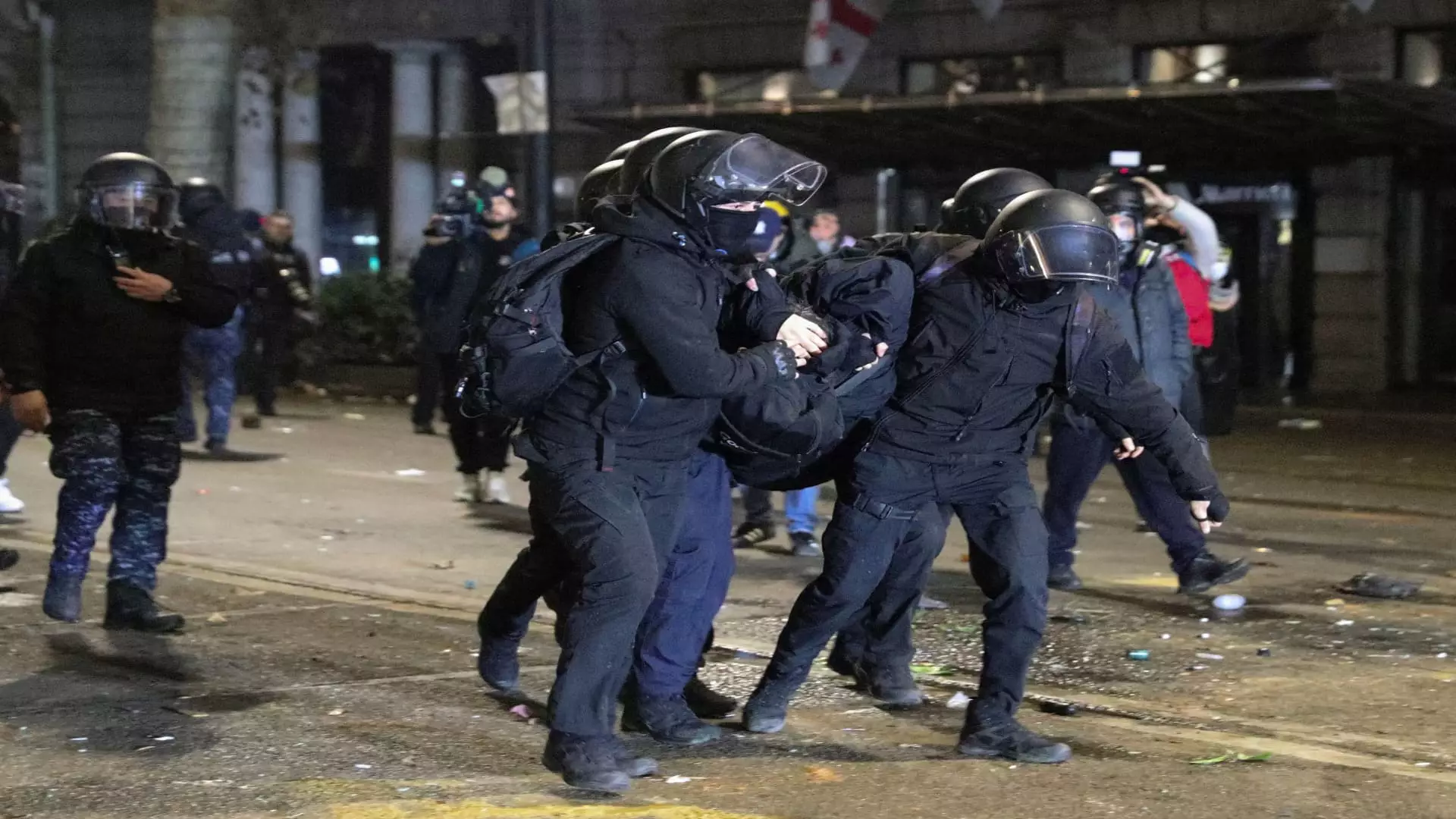Over the weekend, the capital city of Tbilisi, Georgia, became a focal point for anti-government protests following a controversial decision to suspend negotiations for European Union (EU) membership. The protests marked a third consecutive night of unrest, culminating in a significant toll on public safety and health, with 44 individuals requiring hospitalization. Eyewitness accounts described the streets filled with tens of thousands of demonstrators committed to voicing their dissent against government actions. Participants armed themselves with stones, lit fireworks, and expressed their frustration as police responded with water cannons and tear gas—a stark illustration of a deepening divide between the government and its constituents.
The demonstrations reached a symbolic peak when an effigy of Bidzina Ivanishvili, the founder of the ruling Georgian Dream party, was set ablaze. Ivanishvili, a figure often ensnared in controversy due to his billionaire status and ties to Russia, symbolizes for many what is perceived as a drift away from democratic values and European aspirations under his party’s leadership.
Prime Minister Irakli Kobakhidze took a firm stand against the protests, warning that all illegal actions would be met with severe repercussions under the law. He issued a pointed message to those engaging in violence incited by protest—signaling that they would face justice. Kobakhidze also dismissed earlier claims that Georgia’s integration with the EU had been completely stalled. He framed the government’s decision to halt negotiations as a rejection of “shameful and offensive blackmail,” framing it as necessary to protect national interest rather than an abandonment of European goals.
However, the crisis intensified following a critical resolution passed by the European Parliament. The resolution labeled Georgia’s recent parliamentary election as a significant setback for its democratic integrity, further complicating the narrative spun by the government. The Prime Minister also waved off a statement from the U.S. State Department, which announced a suspension of its strategic partnership with Georgia due to this very decision, indicating a resulting shift in international relations that could have long-lasting consequences.
The reaction from the international community has been swift and rebuking. Kaja Kallas, the EU’s foreign policy chief, alongside NATO representatives, expressed alarm over the implications of Georgia’s recent moves away from its democratic commitments and its European integration aspirations. Their statements emphasized that this marked a departure from the trajectory maintained by previous governments—one that had contributed to a pro-European sentiment widely held by the Georgian populace.
The haunting specter of Russia looms large over these events. Many opposition representatives allege that the Georgian Dream party’s victory has been unduly influenced by Moscow, exacerbating fears of Georgia regressing into a ‘quasi-Russian’ state. Accusations of electoral manipulation have spurred claims that the will of the Georgian people has been undermined, leading to calls from the opposition for fresh elections under more transparent conditions.
President Salome Zourabichvili, who espouses a pro-Western stance, has publicly stated that the current trajectory of the Georgian government leads it dangerously close to authoritarianism. Her appeal resonates with protestors demanding not a full-fledged revolution but instead a return to democratic processes where their voices can be echoed through legitimate elections. Zourabichvili’s remarks highlight a growing consensus among citizens that their democratic freedoms must be protected against the encroachment of malign influences—both domestic and foreign.
The EU’s earlier decision to grant Georgia candidate status for membership came with conditions aimed at encouraging democratic reforms. However, the passage of the contentious “foreign influence” law raised concerns that led to a curtailing of support, serving as a wake-up call for those in power to rethink their legislative priorities.
As protests continue and both domestic and international tensions rise, the situation in Georgia represents a critical juncture in its historical struggle for democracy and self-determination. Citizens are at an inflection point; their collective voice has the power to sway the nation’s future. The resolution of these ongoing tensions will ultimately determine if Georgia can maintain its commitment to democratic integrity and European integration, or if it will falter, yielding to authoritarian governance reminiscent of its past. The world watches as Tbilisi becomes a litmus test for the resilience of democratic ideals in the face of adversity and external pressure.

